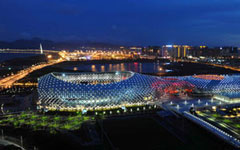First-half growth decelerates in Beijing, Shanghai
By Wei Tian in Shanghai and Zheng Yangpeng in Beijing (China Daily) Updated: 2014-07-19 07:01China's biggest cities recorded slower economic expansion in the first half, but many municipal officials are sounding a confident note, saying that structural changes are laying a solid foundation for future growth.
GDP growth in Shanghai, the nation's largest city and financial hub, slowed 0.6 percentage point year-on-year to 7.1 percent, the city's statistics bureau said on Friday.
Beijing's GDP growth also slowed to 7.2 percent in the first half from 7.7 percent a year earlier. But the traditional services center of the nation said activity in this sector kept growing, especially high-end services.
 |
|
 |
Xu Fengxian, a regional economics researcher with the Chinese Academy of Social Sciences, said that as the two cities have entered the later stages of industrialization, it's inevitable that their growth is slowing even as their service sectors expand.
This is evident in Shanghai, where the overall growth rate was lower than the national level of 7.5 percent, but services, consumption and high value-added industries drove that growth.
The service sector expanded at the fastest pace among all industries, at 7.8 percent in the first half. Its share in GDP growth reached 62.7 percent, 1.0 percentage point more than a year earlier.
Growth in consumption also gained traction, expanding 1 percentage point faster than a year earlier to 11.1 percent, mainly driven by a boom in online sales, which surged 31.8 percent year-on-year.
In comparison, investment growth, which used to be a major engine for the Chinese economy, continued to shrink in Shanghai, with expansion falling by 8.3 percentage points to a mere 3.8 percent in the first six months.
Another notable fact is the trade in services grew faster than merchandise trade. Yan Jun, chief economist with Shanghai's statistics bureau, said this was obviously a result of the establishment of the China (Shanghai) Pilot Free Trade Zone, which has brought more opportunities to service companies by removing investment barriers.
- Alibaba allegedly blackmailed by media institution
- Chinese, Venezuelan central banks ink co-op deal
- Timetable set for Shanghai-HK Stock Connect
- China approves $41b in RQFII quotas
- China telecom giants form joint venture
- All cheers for Chongqing wedding expo
- Step toward good governance
- Monkey King journeys to the West
















